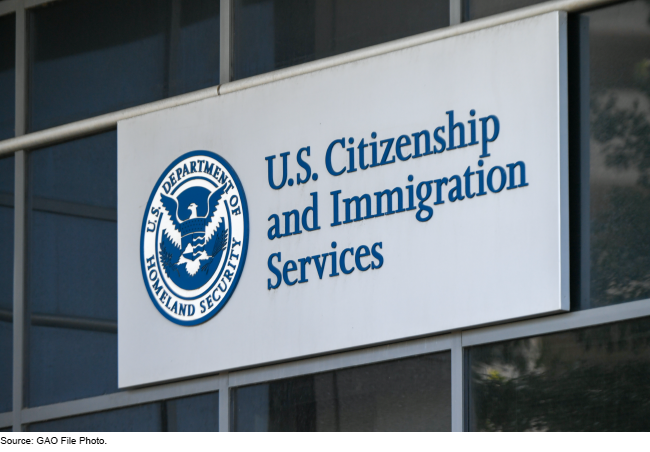Immigration: Information on Deferred Action for Childhood Arrivals
Fast Facts
Under the Deferred Action for Childhood Arrivals (DACA) program, U.S. Citizenship and Immigration Services can provide temporary protection from removal for certain noncitizens who came to the United States before age 16.
In 2012, USCIS published guidance explaining that it would not proactively provide information from denied DACA requests to immigration enforcement agencies unless the requestor posed a potential public safety risk or the request was potentially fraudulent.
We found that USCIS shared such information with enforcement agencies in rare circumstances (fewer than 900 cases) between June 2012 and June 2021.

Highlights
What GAO Found
In 2012, U.S. Citizenship and Immigration Services (USCIS) published guidance explaining that it would not proactively provide information from Deferred Action for Childhood Arrivals (DACA) requests to immigration enforcement agencies for the purpose of immigration enforcement, unless the DACA requestor met certain criteria. For example, USCIS may refer certain DACA cases to U.S. Immigration and Customs Enforcement (ICE) for a possible criminal investigation if the requestor represents a potential public safety risk based on the individual's criminal history or to identify fraudulent claims. USCIS has shared information with ICE for immigration enforcement purposes on a small number of DACA requestors and recipients who engaged in activities that disqualified them from DACA. Specifically, of the 106,000 DACA requests that USCIS denied, it referred fewer than 900 cases (less than 1 percent) to ICE (see fig.).
Outcomes for Deferred Action for Childhood Arrivals Requests and Approximate Number of Referrals to U.S. Immigration and Customs Enforcement, June 2012 through June 2021

Since 2012, U.S. Customs and Border Protection (CBP) and ICE enforcement practices related to DACA recipients and individuals who might qualify for DACA have generally aligned with the Department of Homeland Security's (DHS) immigration enforcement priorities. While DHS's immigration enforcement priorities have varied since 2012, the department has generally not considered DACA recipients to be immigration enforcement priorities unless they met specific criteria, such as having engaged in certain types of fraud or activities that posed a threat to national security or public safety. While DACA recipients are to be provided temporary protection from removal, individuals who might qualify to receive DACA but who have not yet submitted a request, or are awaiting approval, do not have such protection. However, CBP and ICE officials stated that they have generally extended prosecutorial discretion considerations to individuals who may have potentially qualified for DACA as long as they had not engaged in activities that would disqualify them from a favorable exercise of such discretion.
Why GAO Did This Study
In June 2012, DHS established the DACA initiative. Under DACA, DHS has the discretion to provide temporary protection from removal from the U.S. (or, deferred action) for certain noncitizens who came to the U.S. before age 16. DACA recipients are neither granted lawful immigration status nor put on a pathway to lawful status. Rather, they are considered to be lawfully present in the U.S. during the 2-year period of deferred action. USCIS has granted DACA to more than 800,000 noncitizens. In July 2021, a federal court ruled that USCIS may not approve first-time DACA requests but temporarily permitted USCIS to continue to approve renewals of previously approved requests.
GAO was asked to review the extent to which USCIS shares information on DACA requestors and recipients with immigration enforcement agencies. This report describes (1) the circumstances under which USCIS shares information on DACA requestors with immigration enforcement agencies and (2) how CBP and ICE have applied DHS's immigration enforcement priorities to DACA recipients and those who may have potentially qualified for DACA since 2012. GAO analyzed USCIS, CBP, and ICE policies and guidance; analyzed USCIS data on adjudication outcomes and the circumstances under which USCIS shared information on DACA requestors with ICE from June 2012 through June 2021; and interviewed relevant headquarters and field officials.
For more information, contact Rebecca Gambler at (202) 512-8777 or gamblerr@gao.gov.
